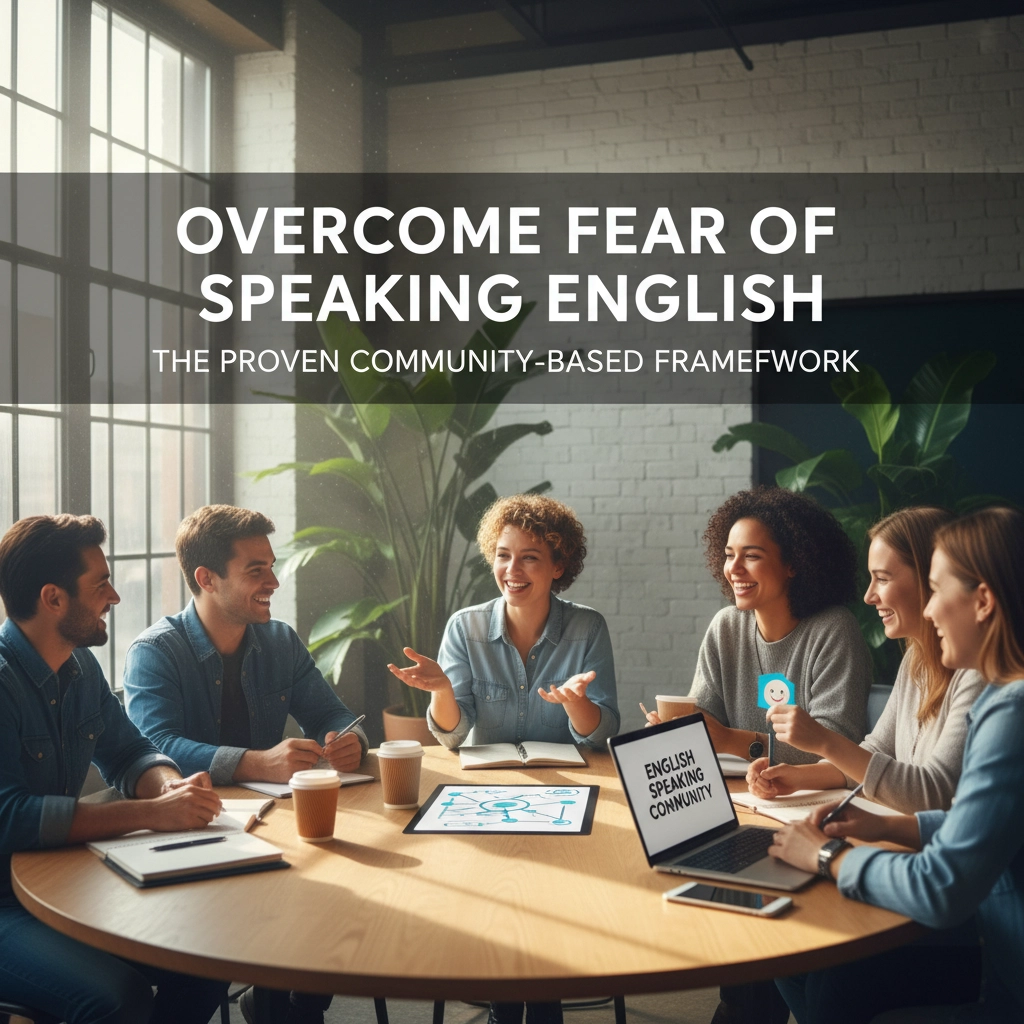Contents
ToggleYou're not alone if your heart starts racing when someone asks you a question in English. That moment of panic, the stumbling over words, the feeling like everyone is judging your accent – it's something millions of English learners face every single day.
I've seen countless students who can write beautiful emails and understand complex English texts, but freeze up completely when it comes to speaking. The good news? There's a proven way to overcome this fear, and it doesn't involve forcing yourself into scary situations or practicing alone in your room.
The secret lies in finding the right community.
Why Speaking English Feels So Scary
Before we dive into the solution, let's talk about why speaking English with confidence feels so challenging in the first place.
When you speak, you're putting yourself out there in real time. Unlike writing, where you can edit and perfect your sentences, speaking happens in the moment. Your brain has to process what someone said, formulate a response, and deliver it – all while worrying about grammar, pronunciation, and whether you're making sense.
Add to that the fear of judgment, cultural differences, and the pressure to sound "perfect," and it's no wonder so many people avoid English conversation altogether.
But here's what I've learned after years of helping people speak English confidently: the problem isn't your English ability. It's the environment you're trying to learn in.

The Community-Based Framework Explained
Traditional English learning often focuses on individual study – textbooks, apps, solo practice sessions. While these have their place, they miss a crucial element: human connection.
The community-based framework recognizes that language is fundamentally social. We don't speak English to walls or computers – we speak it to connect with people. So why not learn it the same way?
This approach centers around three key pillars:
Safe Space Practice: A supportive environment where making mistakes is not just okay, but encouraged. When you know nobody will laugh at your pronunciation or judge your grammar errors, you naturally become more willing to try.
Peer Learning: Learning alongside others who share your struggles creates instant understanding. Your fellow learners become cheerleaders, not competitors.
Regular Interaction: Consistent, low-pressure conversations that gradually build your confidence in English speaking without overwhelming you.
Why Community Learning Works Better
When you join a supportive English learning community, something magical happens. The fear starts to melt away, not because you suddenly become perfect, but because you realize perfection was never the goal.
In my experience, students who learn in communities progress faster than those who study alone. Here's why:
You get real feedback from real people. Not just grammar corrections, but genuine responses to what you're actually trying to communicate. This helps you understand if your message is getting across, which is what conversation is really about.
The pressure disappears when everyone is learning together. That person who just mispronounced "comfortable"? They're not judging your accent. They're probably relieved they're not the only one who finds English pronunciation tricky.
You develop English conversation confidence through repetition without embarrassment. The same topics come up naturally in different conversations, giving you multiple chances to practice expressing similar ideas.

The Step-by-Step Framework
Ready to put this into action? Here's your roadmap to overcome fear of speaking English using community support:
Step 1: Start With Listening
Join your community as a listener first. Participate in group calls or discussions without the pressure to speak much. This helps you get comfortable with the environment and the other members' speaking styles.
Focus on understanding rather than responding perfectly. When you do speak, start with simple agreements or short questions.
Step 2: Practice Low-Stakes Interactions
Begin with small group conversations or one-on-one chats within your community. These feel less intimidating than large group discussions.
Share something simple about yourself – your favorite food, your hometown, or what you did last weekend. These familiar topics require less mental energy to discuss, leaving more bandwidth for focusing on how to be confident in English.
Step 3: Embrace Imperfection
Here's a mindset shift that changes everything: aim for communication, not perfection. If someone understands what you're trying to say, you've succeeded – even if your grammar wasn't textbook perfect.
In supportive communities, members often help each other find words or clarify meanings. This collaborative approach removes the pressure of having to be perfect from the start.
Step 4: Build Speaking Habits
Consistency beats intensity every time. Regular, short conversations are more effective than occasional long practice sessions. Many successful communities have daily check-ins or weekly discussion topics that give you natural opportunities for practical English speaking.

Step 5: Challenge Yourself Gradually
As you become more comfortable, slowly expand your comfort zone. Maybe start giving longer responses, or initiate conversations on topics you're passionate about.
The community setting makes this progression feel natural rather than forced. You'll often find yourself speaking more simply because the conversation is engaging, not because you're pushing yourself.
Finding the Right Community
Not all communities are created equal. Look for groups that prioritize learning and support over showing off. The best communities have a few key characteristics:
Welcoming atmosphere: New members are greeted warmly and encouraged to participate at their own pace.
Mixed skill levels: Having both beginners and advanced speakers creates natural mentorship opportunities.
Regular activities: Consistent meetups, discussion topics, or practice sessions keep engagement high.
Focus on communication: The emphasis is on understanding and being understood, not on perfect grammar or native-like pronunciation.
Real Results From Real People
I've watched shy beginners transform into confident English speakers through community learning. Take Sarah, who joined one of our discussion groups barely able to introduce herself. Six months later, she was leading conversations about her favorite books and helping newer members feel welcome.
Or consider Miguel, who was terrified of mispronouncing words. In his supportive community, he learned that communication matters more than perfect pronunciation. Now he speaks confidently in business meetings and has even given presentations in English.
These transformations don't happen overnight, but they do happen consistently when people have the right support system.

Your Speaking Journey Starts Here
Speaking English practice doesn't have to be a lonely struggle. When you surround yourself with supportive people who understand your challenges and celebrate your progress, everything changes.
The fear that once held you back becomes excitement about connecting with others. The mistakes that once embarrassed you become stepping stones to better communication. And the confidence you've been searching for starts growing naturally through positive interactions.
Remember, every fluent English speaker was once exactly where you are now. The difference between those who stay stuck and those who breakthrough isn't natural talent – it's finding the right environment to practice and grow.
You have everything you need to speak English confidently. You just need the right people to practice with.
Ready to join a supportive English learning community?
Join thousands of English learners who are building confidence through connection. Our free community at www.skool.com/wonderful-world-english provides daily conversation practice, supportive feedback, and a welcoming environment where your English speaking journey can truly flourish.
Join our community for free today and start speaking with confidence tomorrow!





